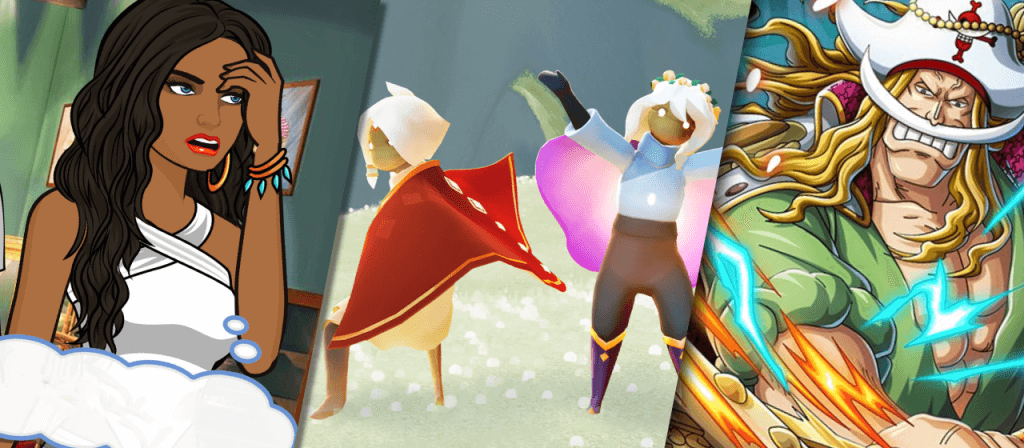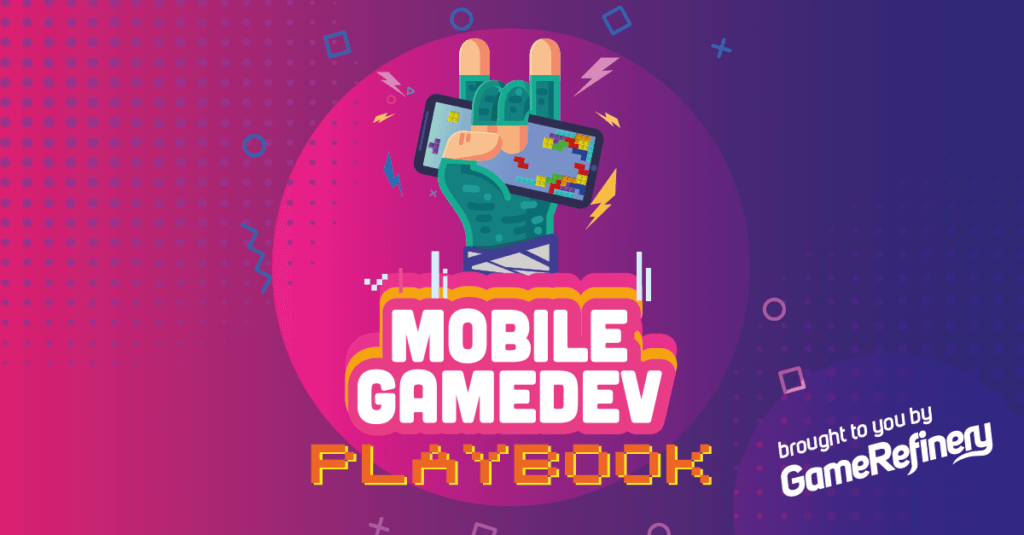In this episode of the Mobile GameDev Playbook, Bob Slinn, Head of Business Development at FunPlus, and game analyst Milka Paunonen from GameRefinery, a Liftoff company, joins our host Jon Jordan to discuss State of Survival’s well-deserved wins in the most recent Mobile Gamedev Awards!
![]()
![]() Spotify, BuzzSprout, TuneInRadio, iHeartRadio
Spotify, BuzzSprout, TuneInRadio, iHeartRadio
– If you enjoy the episode, remember to hit subscribe!
We will discuss the development and inspiration behind State of Survival, the recent trends in the 4x strategy genre, its wins in the categories of ‘Biggest Evolver’ and ‘Best Use of IP in a Collaboration Event,’ and what the future holds for the game.
You can also watch the episode on YouTube:
Topics we will cover in this episode:
- Introduction
- FunPlus and its background
- How does State of Survival fit the 4X Strategy space?
- The Walking Dead collaboration
- Finding the right collaboration fit
- 4X games in the Japanese mobile game market
- Adapting to a new market
- The balance between single-player elements and alliances in 4X games
- Monetization in 4X games
- What’s next for State of Survival?
Read transcript
Introduction
[00:00:13] Jon Jordan: Hello, and welcome to the Mobile GameDev Playbook. Thanks for tuning in for another episode. This is a podcast all about what makes a great mobile game, what is and isn’t working for mobile game designers, and all of the latest trends. I’m your host, Jon Jordan, and in today’s episode, we are diving into what’s been going on with FunPlus’ State of Survival. That’s been exciting. We have two experts, I guess, from both sides or either side of the equation. Joining us from GameRefinery by Liftoff, we have Milka Paunonen. How’s it going, Milka?
[00:00:43] Milka Paunonen: Hey, how’s it going?
[00:00:44] Jon: First time on the podcast. Very exciting.
[00:00:45] Milka: Yes, it’s really exciting. Thanks for having me.
[00:00:51] Jon: You’re coming as our 4X expert. You do various other things that will come into the podcast later on, but you’re also a 4X expert, is it? Thanks for coming on, and then we have Bob Slinn, our FunPlus expert, as the VP of Business Development. How’s it going, Bob?
[00:01:08] Bob Slinn: Good. Very good. Great to be here and excited to chat about our games and 4X.
[00:01:15] Jon: Cool. Good. Before we dive into the game, to do a bit of background, Bob, can you tell us what’s been going on? Who is FunPlus? What have they been doing over the years? And where did they get to the situation of making State of Survival?
FunPlus and its background
[00:01:27] Bob: Sure. Absolutely. FunPlus has been around for a little bit over ten years now. It started in 2010. The two founders based in California decided they would build a gaming business, initially focused on Facebook games, and had real success over the first couple of years. Around 2016, they decided to sell that original studio, focused on casual gaming, and then went back to the drawing board and decided to focus on mobile and strategy. That’s the super high-level story.
Interestingly, the company has grown dramatically over the last four or five years since it started in mobile. The first game was King of Avalon, a 4X Strategy game that just celebrated its sixth anniversary. Then they launched Guns of Glory in quick succession, and just three years ago, they launched State of Survival, where I guess I’d say the massive increase happened and the significant shift in trajectory.
The company’s continued to evolve. We have about 2,000 people globally now, and then we have several people in Switzerland, our global headquarters, including me. We have teams all over Europe. We have a studio in Stockholm, and we have people in Barcelona. We have the majority of people in Asia. We have several development studios in China, where all the 4X games are made, and the ongoing ambition is to expand across multiple genres. We’ve just launched a game called Call of Antia, a puzzle RPG game that is our first move beyond 4X. We have had some casual games that we’re testing. The idea is to continue to expand and learn.
Then also, we’re starting to look at expanding across platforms. We have a team that was acquired in 2021 in Irvine, California, with many ex-Blizzard people focusing on thinking about the next generation of IP. Because the long-term vision of FunPlus is thinking about IP within games, and this vision is that the next generation of great IP will come from games. That’s where they’re focusing longer term on how we think about that long-term objective while we continue to focus on growing the mobile business.
How does State of Survival fit the 4X Strategy space?
[00:03:37] Jon: Excellent. It shows the incredible growth that we’ve had for mobile. I think I came across FunPlus before they were called FunPlus while making some casual stuff. It’s so interesting to see that sort of transition of selling off that bit and then going into quite a heavy-duty 4X. At that time, it didn’t seem very clear that the teams were related, but it shows how much I know. I have hundreds of millions of downloads down the line. Okay, good.
Milka, let’s talk a bit about 4X. We’ve had seven or eight years of innovation in the 4X mobile space. Where do you think State of Survival fits within the 4X free-to-play mobile genre? I guess, in particular, why has it had such success? What are the features that make it stand out?
[00:04:25] Milka: I think State of Survival fits quite well for the 4X space at the moment because I believe the increased focus on characters being the main source of power progression has been a huge trend lately, so our games are bringing more characters which can be collected, developed, and used on various missions. This also opens up various monetization possibilities through gachas and direct purchases to support this character collecting and upgrading.
Also, an increased variety of character upgrading methods has been a huge possibility for these 4X games when they evolve in this direction. I’ve been noticing the character-building lately through the story and dialogue. And the theme is also used to bring more depth to the game. That is something State of Survival does well, which is an interesting or important point in their success.
Also, I think hybridization is a massive trend at the moment. Most of the new games entering the top 200 have been utilizing these different hybrid mechanics; some innovative approaches like the merge mechanics, for example, or match 3 puzzle mechanics even has been seen in 4X games lately, so some really surprising combinations.
I think it’s a good way for games to differentiate themselves from their competition. State of Survival has also been differentiating itself with its RPG-hybrid mechanics they implemented. I think, all in all, 4X is getting much-needed extra layers to the gameplay. As a player, it makes 4X on mobile right now interesting and more fun even than before.
[00:06:38] Jon: I think it’s the case. The first wave of 4X games was incredibly abstract. It could be deemed the thing that drove these very strong communities around them, but there was little obvious engagement. You had to work quite hard to get into the game. Once you got into the game, they were very sticky, which is why they were very successful. I remember playing with some of those early ones just like, one, and I have no idea what I’m doing here; two, there are millions of materials I’m collecting everywhere to level things up, but it’s very confusing.
[00:07:12] Milka: Yes, it has also made the games a little more accessible. Maybe that’s the reason why 4X is a rising genre, I think, lately, also.
The Walking Dead collaboration
[00:07:23] Jon: Also, you mentioned hybridization. Suppose you listened to our previous podcasts where we mentioned it constantly. In that case, that is this fascinating thing where many mobile games, no matter what genre, can have many different genres within them. They’re becoming almost Meta platforms for gaming. If you’re interested, go back and listen to some of our previous podcasts where we spent a lot of time on that.
Anyway, let’s focus on State of Survival. In particular, the character is interesting. In the GameRefinery recent awards, State of Survival won two, for biggest evolver and best use of IP in a collaboration event. Maybe, Bob, talk about the best use of IP in a collaboration event because this was very striking. You’ve had a very successful IP event with The Walking Dead. Obviously, they’re both zombie games. You should point out that. That’s the obvious starting point; they’re both zombie IPs.
[00:08:20] Bob: Yes, there’s a natural connection there.
[00:08:22] Jon: Equally, there are a lot of Walking Dead games out there as well. There is this interesting idea that maybe for The Walking Dead, doing a big collaboration with another zombie game has been successful for you guys. Still, there is an idea of cannibalizing existing games or IP holders. Can you talk a bit about how you think that area of making sure you’re not annoying existing IP holders by doing these other things, and obviously, how it played out for State of Survival?
[00:08:51] Bob: Yes, for sure. I think the point Milka made about the importance of the characters and the heroes in our case is central to why we started doing these IP collaborations because I think that was the big innovation in State of Survival. The two parts were thinking about the theme and depth of the story around a post-apocalyptic zombie land and how that might resonate. As we were building the game, we started to see that players did appreciate that, and you could build an incredibly deep story. Then you attach that to the heroes, and people could start to build affinity for the heroes.
Like classic RPG mechanics, there’s a whole process of unlocking the heroes and making them stronger. In addition to building their base and all the classic 4X stuff, they had this other narrative and a whole other way to interact with the game, which made it more accessible. When it came to talking about actual IP and collaborations, what we did is we ask our players. We do many things where we are, not surprisingly, with these types of games; we talk to the community and the players. We did several surveys around ‘what other IP?’. Not necessarily games, just what other IP that they find interesting, and so not surprisingly, The Walking Dead was top of the list. We went slightly before my time, but we went out and talked to AMC and figured out there’s this natural affinity because of the worlds that the two environments, the TV program, and all the other offshoots of The Walking Dead IP live in our game. They were great to work with and quite happy to collaborate. The idea was that we would create a Daryl Dixon hero, they would live in the game, and again, still losing the game, if you’d unlocked him during the six-month integration, you can have him as one of your characters.
There’s this strong RPG element in this continuity. He fit perfectly into the lore and the storyline of State of Survival. The story continues to evolve. It’s all about trying to find a cure to stop the zombies, and you’re building your base and these alliances. It was a pretty natural fit. What we saw, which was interesting, is that people appreciate the connection, probably because it made sense and was a natural thing. We also built a storyline around his arrival, how he would help, and how he would be a new hero to try to take on the zombies.
I think we also do for all of these different integrations, in a core part of the game, we’ll have these events, which are these multifaceted activities. Again, live ops sort of thing where part of it is through the community interactions, part of it is through traditional unlocking and PvE battles that you have to work to unlock the character over time.
When we talk about having a six-month promotion, people could come into the games at various times, and it would take a while to unlock Daryl Dixon. We saw a very, very positive response from the community. I think they appreciated it and fit naturally. Then we did a bunch of marketing activities around that, and from a business standpoint, part of the rationale for this is to help expand the audience. We partnered with the ultimate rights holder. I think the thought was more around these two universes and how they could fit together rather than thinking about the pre-existing games, which are serving different audiences.
[00:12:13] Jon: Why the six months? We previously discussed that maybe that was the longest collaboration we’d ever seen in a game. It just seemed like that. Part of the point of collaborations is you have this limited edition event where you try and force everyone in there and get it done quickly, so six months seems a bit counter-productive.
[00:12:30] Bob: Yes, being super transparent, this was the first one we did. It’s been a learning curve for us. I think this is one of the things that FunPlus, from the beginning, had always built their IP and focused on finding super talented producers, having them build teams around them and building these amazing games. This was the first time we’d collaborated with someone. I think it was partly an experiment and partly just because of the way these things work and the fact that it can take a while to unlock the character. Because, again, depending on your intensity of play, whether you’re spending in the game or not, it can take a while to unlock the character.
To be fair, I think what we did, as you’d expect, there was a big spike in engagement and activity early on. Then we had some marketing beats throughout the six months, but did it need to be six months? In retrospect, maybe not, but overall, I think the way the game works, once you’ve unlocked the character, you’re engaging with Daryl Dixon, effectively, forever. The one we did more recently with the Joker was shorter. It was about three months. I don’t think we saw a similar impact and similar engagement from the community. I don’t know that we need to do six months next time.
Finding the right collaboration fit
[00:13:36] Jon: It’s interesting. You say you did one with the Joker, which has nothing to do with zombies. The flexibility of the IP envelope, which obviously, probably elasticities, could be broken, and you can imagine those things going wrong. The Joker is quite interesting because he’s that chaotic figure, although not specifically a zombie. He was a playable character that the players would use against zombies, wasn’t he?
[00:14:02] Bob: Yes. When I first joined, we were already discussing integrating the Joker, and the process was underway. Again, the immediate reaction is, well, the Joker is not a zombie; he’s not in a post-apocalyptic world. On the other hand, he is this agent of chaos, as you say, and certainly, there’s rich lore around all the different things he’s done, and he’s quite a mischievous character.
What was impressive to me, coming from the outside initially, because I arrived just as that was about to go live, was the games team had built this very involved storyline. An entire secondary storyline around how the Joker would appear in the game, why it made sense, and why people shouldn’t engage. The initial premise was easy, is he good or bad? Because obviously, the Joker historically is very much on the darker side of the spectrum.
He was initially positioned as a friend and was there to do good and help people find a cure. He partnered closely with the doctor, who was one of the main parts of the story and was always trying to find a cure for what infected the zombie. Throughout the three months, there was this arc which, as you went through the events, and as you went through the different activities, it gradually became clear that actually, he maybe wasn’t so good, after all, spoiler alert. It worked very, very well. It was one of those things where, because the story is so deep and because the team spent a lot of time thinking about the story and why it would make sense for him to appear, it ended up working great.
The other interesting thing is by working with Warner Brothers in DC Comics, who owned the IP because we partnered with the comic book character, and there are several different iterations. Our artists created a version of the Joker who would fit within the game and obviously be subject to approval and everything, but that also made it, I think, feel more natural because the art style and everything else corresponded to the rest of the game.
4X games in the Japanese mobile game market
[00:15:53] Jon: Just for the people who haven’t played the game, it is a very interesting thing from the get-go playing through the initial tutorial how often you have a story in there because that’s what gets people going. It’s all a very humorous storyline.
Another thing, as I said, on State of Survival won an award for was the biggest evolver, particularly for a localized version of the Japanese market. Milka. You’re an expert on the Japanese market, in general, and being a 4X expert. Are 4X games generally big in Japan, and the Japanese market is very big for mobile games but tends to be more RPG-focused?
[00:16:29] Milka: Yes, the market, in general, is very RPG-focused, for sure. But, many 4X titles are successful in Japan, also. I have been following the Japanese market for a while. One of the keys to succeeding in the market is to offer more personal and familiar content to the local audience. I think State of Survival has done a good job in the game, emphasizing a little bit of the Japanese characters or the cultural elements in the market, which I feel has been a good way to boost its success in Japan especially.
Adapting to a new market
[00:17:15] Bob: Just to add, I think Japan is an enormous gaming and hugely competitive and unique market. Interestingly, in State of Survival, our biggest markets have tended to be in the West or North America and Western Europe, even though the development team is in China. As we started to look at how we could gradually expand and localize the game, we’ve, over time, added more languages. Japan, again, requires a different level of localization and adaptation.
To make this point, we added different heroes, created a different entry point, and partnered with different Japanese celebrities to create a whole marketing campaign. To be fair, it’s a hard market. We’re continuing to learn and continue to iterate on the game, but that’s again part of the approach is really, as the game continues to scale and mature coming up to its third anniversary, really thinking about how do we adapt the experience for the different markets? Where can we find the right heroes? Where can we find the right partnerships?
[00:18:13] Jon: Do you think you end up with a situation where you end up running parallel games? I guess The Walking Dead is probably fairly universal, but there will be things that would work well in the Japanese market that would not make sense anywhere else. Do you end up with two different versions of the game?
[00:18:29] Bob: I think the core game experience and the alliances and, really, the collaboration of the community and the base building, all that, can be pretty consistent. To make the point, I think it’s an element of thinking about the visual treatments: do you have heroes that resonate, and where can you find the right local partnerships? Again, it’s an ongoing process because the game has worked as well as it had, partly because the storyline continues to evolve, and there’s an interest there; partly, you’re unlocking heroes. Again, localization is important.
Then thirdly, the community is critical, and like all 4X games, once you get to a certain point, and in our case, you join an alliance, which becomes this incredibly social supportive entity. I think that’s one of the fun things about State of Survival because the theme is bleak, and you’re trying to save the world, yet you have this very strong group of friends. I’ve been in multiple alliances because I get kicked out occasionally if I’m not active enough. After all, the bar is pretty high. The friendships are amazing, but we’ve also tried to make it easy for people with translation tools and all these things. I think this balance of trying to make sure we have scalable tools but also make sure we can support communities locally.
[00:19:41] Jon: Always the problem with the alliances you go on holiday, then that’s it.
[00:19:44] Bob: Exactly.
[00:19:46] Jon: People never go on holiday.
[00:19:47] Bob: I‘m continually amazed that you get these 2:00 AM messages for some incredibly important battle and contribution, and it’s amazing. It is the strength of the communities, and the dedication is remarkable
The balance between single-player elements and alliances in 4X games
[00:20:10] Jon: I wonder if that’s going back to our initial talk about hybridization. The secret source of State of Survival is that compared to the classic 4X game, there is quite a lot for a solo player to enjoy farming the stuff, building out that, and getting your heroes and doing those things. 4X games typically try to get people into alliances very quickly because if they’re going to stick, that’s where they’re going to stick. Whereas it seems to me, in my limited experience of it, State of Survival extends that “let’s keep them in the game, let’s keep them enjoying it and getting retained in there”. Then the alliance is more likely to stick when you get in there. Where do you see alliances in that funnel?
[00:20:44] Bob: It’s a great question. I do think as someone who, when I came into the game, I was much more personally much happier to progress and unlock my heroes. There’s a whole PvE pathway, and you can progress through, and your heroes can get gradually stronger and those listening to animations, so you can keep yourself entertained for quite a long time.
At its core, I think the Alliance mechanic and the community keep people around for the long term. It remains the same, just because it’s such a powerful thing. Once you join the alliance and you start competing against other alliances and raids, it is compelling. But again, I think it’s almost more useful and more interesting as a compliment to that when there’s downtime because once you get to a certain level and you’re upgrading your base, it takes a very long time. I think the ability to upgrade your heroes and interact with your heroes differently fills in time or gives you another path to stay engaged in the game.
[00:21:39] Jon: Milka, how do you see trends around alliances and single-player stuff within 4X games? Do we see many trends around that balance between the single-player elements in 4X games and alliances? How’s that shift happening?
[00:21:53] Milka: Oh, yes. I think it’s a huge trend also. Just like you mentioned having this option to play single-player modes or progressing that way is also important. Because for example, when I play as a free-to-play player, progress for me generally is slower than many of the strongest people in the alliance. So it is a way for me to feel like I’m making meaningful progress on my while also trying my best in the alliance activities.
Monetization in 4X games
[00:22:33] Jon: I guess one thing we’ve not spoken about at all is monetization. Monetization is pretty important to the success of a game. Bob, does the effect of adding that longer single-player thing, is that important for monetization? Or with any 4X game, the core of monetization will get people into alliances and get them doing these big alliance wars and these big special events where the alliances are going for it because the rewards are so great.
[00:23:03] Bob: I think it does. It’s another path because people do like the heroes, engage with the heroes, and the heroes become part of the alliance experience because you’ll have your strongest heroes who are representing you in the battle. It presents another avenue where it becomes quite hard to level up your hero, and your hero has attribution skills.
Again, it’s like an RPG model where there are different things you need to try to in different elements and shards you need to acquire over time, so absolutely. Then you have base-building and troops; of course, you need to acquire more troops and lose your troops in battles. So, it’s another element of monetization that’s proven successful.
[00:23:44] Jon: You might correct me if I’m wrong. You can’t just get the best characters with the characters as well. You have to level up in terms of certain generations of characters, is that right as well?
[00:23:54] Bob: Yes, exactly. There are different groupings, and you have to progress with your base. It has to get to a certain level, and each time you get to another level, you also have to level your hero building, allowing you to have your heroes within the building progress. So everything is interconnected. Again, from an engagement standpoint, it’s great because there are all these different vectors between the big battles and the big excitement.
You’re always thinking, okay, well, have I got my heroes to this level? Have I got this happening? Am I doing my PvE way, which is another way to, again, unlock assets? It is a multifaceted experience. I find myself losing way more time than I would care to admit. I’m always going in to harvest a few things, then 45 minutes later, you’re still there, and it’s quite compelling.
What’s next for State of Survival?
[00:24:41] Jon: Cool. Good. Now, there are many things you’re not going to talk about, but I wonder, in general, if you can talk about State of Survival’s third anniversary coming up. Where do games like that go? Do you end up on a treadmill of more characters, always exciting, and more events for the alliances? Is that the trajectory now that it goes on because now, clearly, we have mobile games that have been successful for ten years? How far do you look into the future of these games? I’m sure State of Survival will last for ten years as well.
[00:25:12] Bob: It’s an interesting one because, again, you have these players who are incredibly engaged, who spend a lot of time with their alliance. I think the nature of the game and social fabric of the game means that there isn’t specifically a shelf life. If you’re engaged, your alliance is strong, and you want to battle, that will continue to be interesting and relevant. I think, again, like all games of a certain maturity, live ops are very important, and I think, particularly how this game works, there is a high frequency of these different events. I think we’re trying to do now that we’ve been doing things for the community for a while, as in more traditionally discord, Facebook, Instagram, whatever else.
We have very active communities on social platforms, but we’re also really thinking about how we can connect with that community differently. We just did an event in Berlin recently where we had a number of our most engaged players effectively come to a physical event, and it was quite fun. We had actors dressed up as zombies and prizes and interacted with different people from the community and our team. That was super fun.
It was in this abandoned, some sort of like a radar station or something. It did look post-apocalyptic. So we’re trying to, again, be creative around how we can engage with our players beyond the, I’d say, normal channels. I think that’s part of what we’re trying to do. If you look at King of Avalon, which was the first game we launched, which is six years old and still going strong, we’ve just done a big release which has affected a whole new theme around the way the game looks and the way the game plays called Frost & Flames.
It’s all Arthur-era Knights and dragons, but now there’s this new set of lore, history, and characters to experience. That, again, I think is the first time we’ve done something like that. So not to say that’s imminent for State of Survival, but there are different ways to continue to keep the experience fresh and exciting.
[00:27:07] Jon: I guess in an apocalyptic world, you have quite a lot of variations, quite a lot of opportunities to do wacky things.
[00:27:13] Bob: Well, that’s pretty fun. The heroes continue getting stranger, and I think we will continue to look at the right types of partnerships and bring the right characters even though there is, again, this strong tradition of, really, the writers and the producers coming up with their own storylines and their own character development.
[00:27:30] Jon: Cool. Good. Excellent. That was brilliant. For people who haven’t been playing State of Survival, now is the time to download it and see what’s going on there. Thanks very much for your time, Bob. That was fascinating.
[00:27:41] Bob: Oh, thank you, Jon. That was great. Great chatting with you. It was a pleasure.
[00:27:47] Jon: Thanks, Milka, for coming on and giving us your expert opinion.
[00:27:49] Milka: Thank you.
[00:27:50] Jon: I hope you’ll come back. I hope we weren’t too terrifying. Good. Thank you for you, listeners and watchers, depending on how you consume the podcast. Please, subscribe via your podcast provider of choice and come back next time. We are talking to the people building out this fascinating mobile games industry, now the biggest part of the entire games industry, and now we see they’re building out these very long-term products that are evolving in fascinating ways. If you subscribe to the podcasts, you’ll find out what’s coming next. See you next time. Thanks for listening.




















